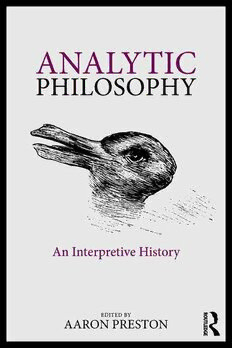Table Of ContentANALYTIC PHILOSOPHY
AnalyticPhilosophy: AnInterpretiveHistoryexploresthewaysinterpretations(ofkey
figures, factions, texts, etc.) shaped the analytic tradition, from Frege to Dummet.
It offers readers 17 chapters written especially for this volume by an international
cast of leading scholars. Some chapters are devoted to large, thematic issues like
the relationship between analytic philosophy and other philosophical traditions
such as British Idealism and phenomenology, while other chapters are tied to
morefine-grainedtopicsortoindividualphilosophers,likeMooreandRussellon
philosophical method or the history of interpretations of Wittgenstein’s Tractatus.
Throughout, the focus is on interpretations that are crucial to the origin, devel-
opment, and persistence of the analytic tradition. The result is a more fully
formed and philosophically satisfying portrait of analytic philosophy.
Aaron Preston is Associate Professor and Chair of the Philosophy Department at
Valparaiso University. He is the author of Analytic Philosophy: The History of an
Illusion(2007)andanumberofarticlesonthehistoryandhistoriographyofanalytic
philosophy and on the philosophy of religion.
This page intentionally left blank
ANALYTIC PHILOSOPHY
An Interpretive History
Edited by Aaron Preston
K ~~o~;J~n~~~up
ORKYOR LONDOLNLOONNDDOONN
Y
LONDONANDNEWYORK
Firstpublished2017
byRoutledge
711ThirdAvenue,NewYork,NY10017
andbyRoutledge
2ParkSquare,MiltonPark,Abingdon,OxonOX144RN
RoutledgeisanimprintoftheTaylor&FrancisGroup,aninformabusiness
©2017Taylor&Francis
TherightofAaronPrestontobeidentifiedastheauthoroftheeditorial
material,andoftheauthorsfortheirindividualchapters,hasbeenassertedin
accordancewithsections77and78oftheCopyright,DesignsandPatentsAct
1988.
Allrightsreserved.Nopartofthisbookmaybereprintedorreproducedor
utilisedinanyformorbyanyelectronic,mechanical,orothermeans,now
knownorhereafterinvented,includingphotocopyingandrecording,orinany
informationstorageorretrievalsystem,withoutpermissioninwritingfromthe
publishers.
Trademarknotice:Productorcorporatenamesmaybetrademarksorregistered
trademarks,andareusedonlyforidentificationandexplanationwithoutintent
toinfringe.
BritishLibraryCataloguinginPublicationData
AcataloguerecordforthisbookisavailablefromtheBritishLibrary
LibraryofCongressCataloginginPublicationData
Names:Preston,Aaron,editor.
Title:Analyticphilosophy:aninterpretivehistory/AaronPreston.
Description:NewYork:Routledge,2017.
Identifiers:LCCN2016035780|ISBN9781138800786(hardback)|
ISBN9781138800793(pbk.)
Subjects:LCSH:Analysis(Philosophy)--History.
Classification:LCCB808.5.A5232017|DDC146/.409--dc23
LCrecordavailableathttps://lccn.loc.gov/2016035780
ISBN:978-1-138-80078-6(hbk)
ISBN:978-1-138-80079-3(pbk)
ISBN:978-1-315-73305-0(ebk)
TypesetinBembo
byTaylor&FrancisBooks
For Monica Madan,
whose skill in interpreting life has brought me great joy,
and from whom I am continually learning.
This page intentionally left blank
CONTENTS
1 Editor’s Introduction: Interpreting the Analytic Tradition 1
Aaron Preston
2 Idealism and the Origins of Analytic Philosophy: Moore
Interprets Kant and Bradley 20
Peter Hylton
3 The Changing Role of Language in Analytic Philosophy 34
Scott Soames
4 Russell, Ryle, and Phenomenology: An Alternative Parsing of
the Ways 52
James Chase and Jack Reynolds
5 Some Main Problems of Moore Interpretation 70
Consuelo Preti
6 Russell’s Philosophical Method: How Analytic Philosophy is
Shaped By and Perpetuates Its Misinterpretation 85
Rosalind Carey
7 Analyzing Wittgenstein’s Tractatus 103
Anat Biletzki
8 The Later Wittgenstein 118
Duncan Richter
9 Frank Ramsey and the Entanglement of Analytic Philosophy
with Pragmatism 131
Cheryl Misak
viii Contents
10 From Scientific to Analytic: Remarks on How Logical
Positivism Became a Chapter of Analytic Philosophy 146
Alan Richardson
11 Ernest Nagel’s Naturalism: A Microhistory of the American
Reception of Logical Empiricism 160
Christopher Pincock
12 “One of My Feet Was Still Pretty Firmly Encased in This
Boot”: Behaviorism and The Concept of Mind 175
Michael Kremer
13 Quine: The Last and Greatest Scientific Philosopher 193
Sean Morris
14 P. F. Strawson: Ordinary Language Philosophy and
Descriptive Metaphysics 214
Hans-Johann Glock
15 Austin Athwart the Tradition 229
Kelly Dean Jolley
16 Davidson’s Interpretation of Quine’s Radical Translation, and
How It Helped Make Analytic Philosophy a Tradition 240
Lee Braver
17 Dummett’s Dialectics 254
Anat Matar
18 On the Traditionalist Conjecture 269
Sandra Lapointe
Index 288
1
’
EDITOR S INTRODUCTION
Interpreting the Analytic Tradition
Aaron Preston
This collection aims to examine the role of interpretation in shaping analytic
philosophy, understood here as a philosophical tradition (more on which shortly).
Centraltothisprojectisthenotionofatradition-shapinginterpretation.By“tradition-
shapinginterpretation”Imean (roughly)an interpretation that wasor iscrucial to
the origin, development, or persistence of a tradition. Some tradition-shaping
interpretations interact with the relevant tradition at a relatively fine-grained
level, pertaining directly to the canonical figures, factions, views, and texts that
comprise it. For example, the logical positivists’ interpretation of Wittgenstein’s
Tractatus facilitated grouping Wittgenstein and the positivists together as “analytic
philosophers” in a way that would not otherwise have been possible. Thus it
indirectly shaped the analytic tradition as a whole: both Wittgenstein and the
logical positivists are core, canonical members of the tradition in part because of
this early interpretation of Wittgenstein (which most would now regard as a
misinterpretation).
Other tradition-shaping interpretations occur at a more coarse-grained level,
pertaining directly to the tradition as a whole. For instance, it was once widely
believed that analytic philosophy was defined by a commitment to linguistic
analysis as the uniquely correct philosophical method and that there were clear
boundaries between analytic philosophy, pragmatism, and so-called “Continental
philosophy.” Butthingshave changed. No one thinks that contemporary analytic
philosophy is committed to linguistic analysis, and historians of analytic philosophy
question whether this was a defining commitment of the tradition at any stage of
its development. Meanwhile, new interpretations of Quine portray him as a
pragmatist as much as an analyst (cf. Godfrey-Smith 2014), thus blurring the lines
between the two traditions and causing us to wonder whether they were ever
that clear to begin with (on this latter point, see Cheryl Misak’s chapter in the

